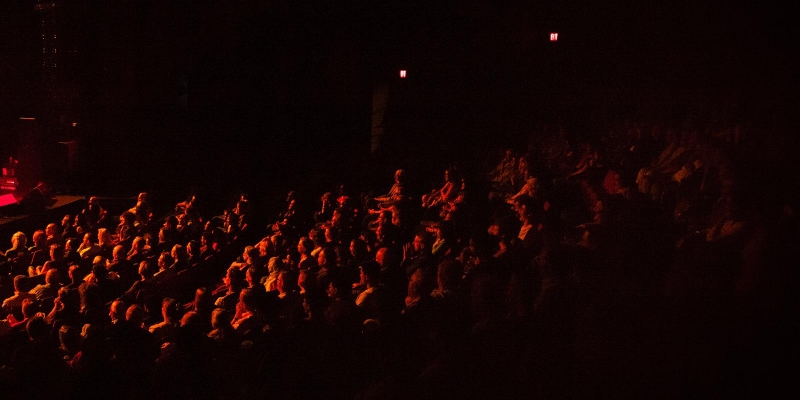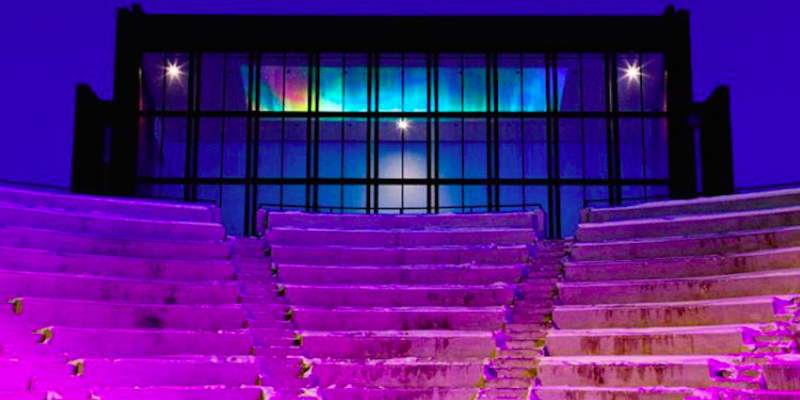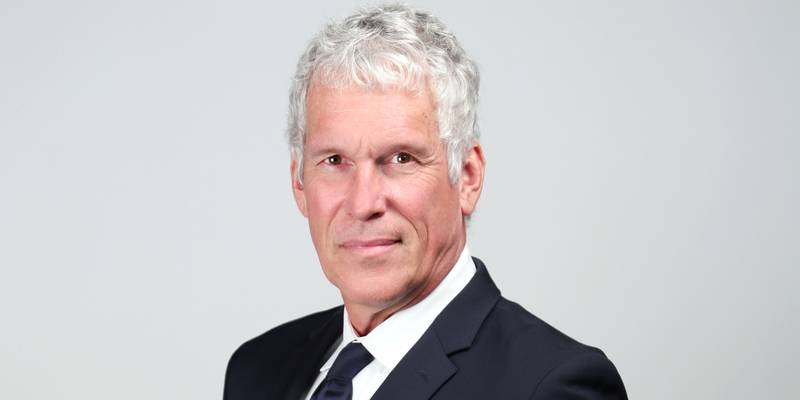ELLNORA: The Guitar Festival, one of Krannert Center’s premiere events, is already underway, and it will draw in a multitude of music lovers from C-U and beyond over the course of the weekend. One of those music lovers happens to be the man in charge at Krannert Center for the Performing Arts, Director Mike Ross. In the flurry of activity this week, it shouldn’t go unnoticed that Ross is celebrating the 20th anniversary of being at the helm of this beloved institution. In the 20 years he’s been a part of the C-U and campus communities, he’s made an indelible impression on the cultural landscape here.
Ross came to Champaign-Urbana from New York City, where he was the director of The Miller Theater at Columbia University. He has not only developed the Krannert Center into a world class venue that is also accessible and appealing to a wide swath of the community, but as an Associate Dean of the College of Fine Arts he has established himself as champion for the arts across the entire University of Illinois campus, forging many initiatives and partnerships with other academic units. He has served on numerous campus committees, chaired the cross-campus Seedbed Initiative for Transdomain Creativity (which helped establish the eDream Institute at U of I, of which he is an advisor), and he has written several well-regarded papers on cultural centers, creativity, and technology in the arts. Ross has also served the broader C-U community as a founding member of 40 North and co-chair of the 2013 Champaign County United Way Campaign. I had the pleasure of sitting down with him this week, amidst the frenzy of Ellnora.
Smile Politely: What led you to pursue a career in the arts?
Mike Ross: Wow… well I can’t remember a time when I was growing up where I didn’t assume that I would be doing something in the arts. I was involved in music and visual arts from a very early stage, and my interest in both of those as well as architecture and the literary arts just increased up through high school where I had a very powerfully influential music teacher. There was a big moment of decision making I had to face when applying to college. I’d narrowed it down between music and architecture and I chose music. I’ve never regretted that.
My undergrad degree is in music education, and I assumed I’d be a music teacher. But my interests expanded to composing, and I ended up going to grad school to focus on composition and got my doctorate from Columbia University in composition. I’d often been involved in organizing concerts, and I had an interest in organizing opportunities for artists and communities to come together. Eventually I realized my passion for seeing what good can come from having audiences come into contact with artists, and my interest in that overcame my joy in making music.
SP: You came here from New York City. What was it like moving to C-U from there?
Ross: I get asked that all the time. I grew up in California, in a very small rural community, and going to the big city was a big shift. I was surprised at how different people could be. There was definitely a cultural shift in going to New York. I loved New York and was not looking to leave at all. When I agreed to come look (at Krannert) I was really intrigued by what I saw here and the conversations I was having with people. It was too intriguing an opportunity not to try. Because neither myself nor my wife had grown up exclusively in New York, it wasn’t the culture shock people assume it might have been. We’ve never regretted moving from New York to here. This community has so many interesting people and things going on. It’s been a continuous journey of being inspired and stimulated and rewarded by living here. One of the things I had trouble with in my earlier years here was helping to find ways to more compellingly and accurately portray the specialness of this place. When New Yorkers think about places outside of New York their respect and appreciation pales pretty quickly. It became a personal challenge to come up with language that might help people think about this place differently.

SP: Over the course of the 20 years that you’ve been here, what’s one of the most important directions that Krannert has taken?
Ross: I hesitate to answer the question, but I will. In general, it’s the concerted effort that we’ve made to expand the diversity of the work the we do. Alongside that, doing everything we can to keep the doors of Krannert Center open wide to people from all walks of life. It’s very easy for cultural institutions to have a very narrow focus, whether it’s aesthetically or in terms of target markets. I would hope that one could take a look at Krannert Center over the past 20 years and be able to point to the various things that factor into those efforts. ELLNORA is hopefully one very visible example of the kind of philosophy I was just alluding to.
SP: So speaking of ELLNORA, I’m sure you’re quite a busy man this week. How much do you get to sit back and enjoy the acts that come through?
Ross: I can answer that now differently than I would’ve been able to 10 or certainly 20 years ago. Everybody in this organization is running hard, and there’s a lot of investment in each and every one of the activities that goes on. I can happily say that when I walk into a performance I can be more fully in the moment than I was able to in times past. That’s because there’s just a fabulous team at the Center. That’s not to say that I can just walk into a theater every time and just completely feel disconnected from the responsibilities of the institution, but there’s a stronger inner sense of confidence in the capacity of the institution to support the needs of the artists and the audience.
SP: I love getting my Krannert guide at the beginning of each season and seeing all of the new stuff that’s coming through that year, but there are also some of those standbys that come back year after year that people look forward to. Do you have a favorite one of those established programs?
Ross: Well I think the only artist that we have every year is the Mark Morris Dance Group, and of course I’m a great fan of Mark’s creativity but also his human spirit and the way he has built his company. What a lot of people don’t realize is how much he and his company members give to the community while they’re here. But if you go into any of the areas of programming that we do, we do have a handful of very strong long term relationships that I hope will extend long into the future. I think it’s terribly important to always be introducing unfamiliar artists into the mix of opportunities here at the Krannert Center, but I also think there are many things to be gained by having longstanding relationships.
And you know, we’ve talked about programming, but what we haven’t touched on yet is Krannert Center supporting the academic units within the school.

SP: You’re right, we haven’t. This is a part of the University of Illinois, and a space for all of the different performing arts programs.
Ross: There is a deeply embedded commitment at Krannert Center to our colleagues in those units. Sometimes it’s easily narrowed down to a technical support role, but it goes way beyond that. I certainly have benefitted from all of the dialogues, conversations, collaborations, and partnerships that have developed. And not just with the performing arts units, but academic units far and wide across campus. It’s one of those things that fuels my own energy and thinking, having the opportunity to be in informal settings alongside so many committed thinkers and doers. It’s this very rich interactive blending between the professional presenting work that we do, inviting artists in from all over the world, alongside that commitment to the academic tradition.
SP: So to wrap things up here, since you’ve been here 20 years you’re now a full-fledged “townie”… and because we’re Smile Politely and this is the kind of stuff we’re interested in… a few quick questions: What’s your favorite restaurant, and let me preface that by saying I’m pretty sure I would have a hard time answering that question.
Ross: Oooo, I can’t answer that. Let’s just say it would’ve been an easier question 20 years ago, but I don’t think I can answer that now. That’s like asking what my favorite artist is.
SP: What’s your favorite arts venue (beside KCPA)?
Ross: Well it would just be insane not to say the Krannert Art Museum. They’re like our sister organization.
SP: Last one, what is your favorite uniquely C-U place?
Ross: One of my favorites is the Round Barns. They’re just sort of magical. I see them often, and one time I stopped my car, and we’d just had a snowfall, and the time of day… it was magical. I know they were sort of experimental research barns, but there’s just something about them.

Photo from University of Illinois website.
———
The diversity of offerings and commitment to higher education at Krannert make it truly reflective of the culture of C-U, and it’s clear that Mike Ross and his team have been quite successful in creating that connection over the past 20 years. “Mike is a champion of these artists and the arts industry,” says Bridget Lee-Calphas, Advertising and Publicity Director for Krannert. “That’s why so often throughout his career he’s been called to leadership roles with the Association of Performing Arts Presenters and other such groups. As an Associate Dean of the College of Fine Arts, he’s brought in groups such as NCSA and the eDream Institute and other high tech innovations that benefit the arts, and that the arts benefit. It’s been really powerful and a hallmark of his leadership.” Artistic consultant Jerry Yoshitomi echoes the sentiment. “Ross was one of the first presenters to recognize the importance of cooperating with all aspects of the university and saw the clear role of the Krannert Center impacting across campus.”
Here at Smile Politely, we look forward to seeing how Mike Ross will continue to influence Krannert, the university, and Champaign-Urbana with his passion and dedication.








